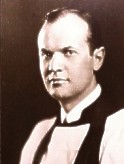Elmore McKee
Elmore McNeill McKee was born in Ridgewood, New Jersey on March 28, 1896 - the same year as Velma Carson - to Oliver and Julia (Wilber) McKee. His father was a writer and had traveled abroad, so McKee would come by his world view rather naturally. His brother, Oliver Jr., would also become a writer - a newspaper man.
McKee around age 40.
After high school, McKee attended Yale University, enrolling in the Reserve Officer
Training Corps while pursuing a bachelor's degree in divinity studies. He was drafted before completing his studies and attained
the rank of 1st Lieutenant.
It may have been while in the service that he had his first real exposure as a writer. Representing the Office of the
Surgeon-General of the Army, he wrote an article titled "The Venereal Problem - The Army Viewpoint," for what is now called the
New England Journal of Medicine. While it might be expected that a man studying for a Bachelor of Divinity degree might
include a considerable amount of moral overtone to such a piece, that was not the case. Instead, much as with most of his public
pronouncements later in life, his approach was entirely practical and no-nonsense in nature. Wars were won by healthy combatants
and every person laid low by disease reduced the likelihood of victory. Furthermore, after the war, every able-bodied man would
be needed to revive a country's economy. The often-delayed effects of venereal disease would present a threat that may not
appear until well after fighting had ceased.
The piece also displayed a favorite McKee writing technique. He'd often make a somewhat puzzling or controversial
initial statement to capture the reader's attention and then explain what was meant. The journal's article began
with the following sentence:
The Army viewpoint is that between the battle line of von Hindenburg and that of venereal disease, there is a very real connection.
His reference to Paul von Hindenburg, the leader of the German Army, would have been well understood by any reader of the era.
But even the public mention of venereal disease was a bit shocking at that time without combining it with a well-known public
figure.
McKee then went on to explain:
The former is a visible, tangible barrier to the Allied advance upon Berlin, the latter a vast hidden barrier within the
ranks of the Allied powers.
His writing style in this publication also showed the directness that characterizes his later efforts - as well as his
tendency to omit words:
To combat venereal disease, some adhere [to the notion] that it is better to hide one's head in the sand with the ostrich in an attempt to dodge the facts and conceal the danger. But, fortunately, the national and world crises and the immediate need of conserving manpower, have shown this class of reticent and excessively immaculate individuals, that they and the ostrich too can make a better fight in the open and in full view of their adversary.
On June 22, 1918, while still in the army, McKee married Katherine Truslow, another native of the Garden State.
After his discharge from the service in 1919, the couple settled in New Haven, Connecticut where McKee again
attended Yale. Their daughter Katherine was born there in 1920. The following year, he graduated first in his class,
receiving a BD degree. He then spent a year studying at the University of Edinburgh in Scotland. Upon returning,
he completed his seminary training and was ordained. That same year in June, Elmore Jr. was born.
For the next two years, McKee was the assistant pastor of St. John's Church in Waterbury, Connecticut. He returned
to New Haven in 1924 as the rector of St. Paul's Church and apparently again enrolled in Yale, receiving his master's
degree in 1927. He then accepted the position of the school's very first chaplain.
In 1930, the family moved to Buffalo, New York, where McKee had accepted the position of rector at Trinity Church,
a position he held until 1936. While there, he became a confirmed pacifist.
He moved to New York City to become the rector of St. George's Church, a religious institution that can trace
its beginning back to the middle of the 18th century. It is a church that had long been involved in social causes
and would have fit McKee's perspective very well.
But all was not well at home. Daughter Katherine had been committed to the Newark State School for the Mentally
Defective sometime in the 1930s. By the early 1940s, McKee and his wife Katherine had separated. It is not known precisely
when McKee and Katherine divorced, but when she died in New York in October of 1960, her status was listed as divorced.
McKee's tenure at St. George's apparently ended in 1946. He declared he was taking a leave of absence and heading
west for an extended period to recover from 10 years of hard work. During those years, in addition to his duties
at St. George's, he made a point to preach at least four times a year at other churches, helped Jewish groups
after the war and traveled abroad to aid the U.S. Government's efforts to convert Germany to a democracy.
While McKee continued to see himself as a clergyman, it appears he never again served in that capacity at a
church. His efforts after the war seemed to be focused entirely on peace and good will between people of different countries
and within the United States. He frequently spoke in all parts of the country, both in person and on the radio. One of his favorite
topics was the need for people to play an active role in the democratic process. It was this interest that led to his visiting
Morganville in 1950 to produce a half-hour radio program about its grassroots efforts to help Fèves and to later visit a second
time to update his previous material on the villages' twinning for inclusion in his 1955 book, The People Act.
On July 7, 1962, McKee married again. His wife was the widow Jessie Cunningham Bearshear. The wedding was in San
Francisco and both were 66 years old. Jessie died in 1983 and McKee died eight months later in 1984 - the same year
Velma Carson passed. McKee was buried in New Haven, his occupation on the death certificate listed as
clergyman.


